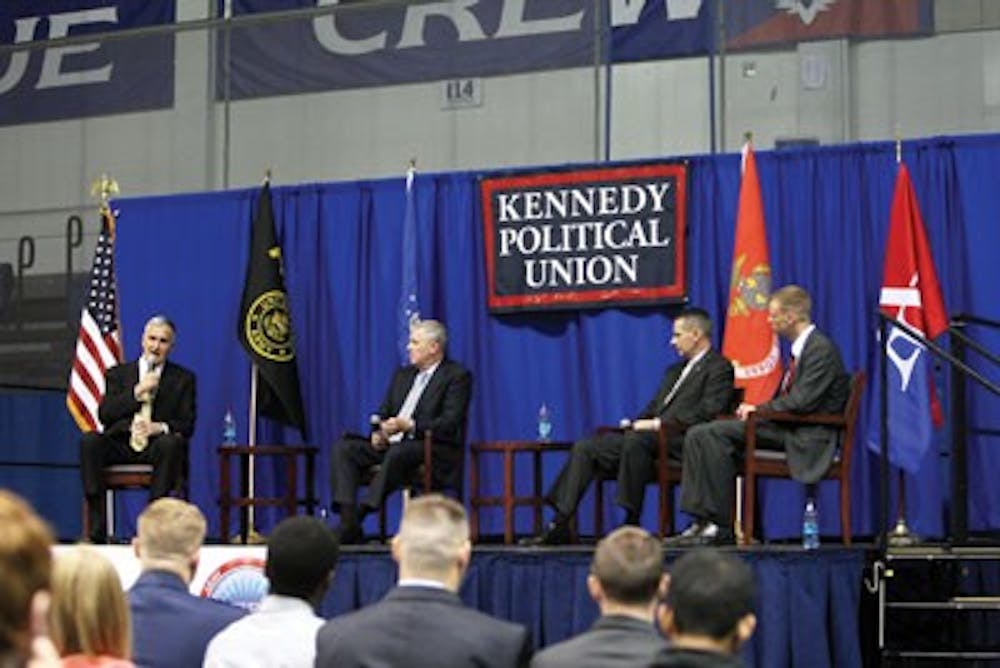Three former chairmen of the Joint Chiefs of Staff, Gens. Hugh Shelton, Richard Myers and Peter Pace, came together for the first time on stage Monday night at a Kennedy Political Union event.
As chairmen of the Joint Chiefs of Staff, the generals were the top military advisers to the president, the secretary of defense and the National Security Council. They were also the highest-ranking military officers in the United States.
Gen. Shelton, of the U.S. Army, served as chairman from 1997 to 2001. Gen. Myers, of the U.S. Air Force, served as chairman from 2001 to 2005 and Gen. Pace, of the U.S. Marine Corps, served as chairman from 2005 to 2007. Admiral Michael Mullen of the U.S. Navy has served as chairman since 2007.
Adam L’Episcopo, a senior in the School of International Service who served in the U.S. Army from 2004 to 2007, asked the generals about the quality of veterans’ benefits.
“Do you believe that our current [Veterans’ Affairs] system is moving toward a better welfare, a system that allows veterans to achieve their educational desires regardless of social and economic status, or are more benefits needed, given sacrifices veterans have made in recent years?” L’Episcopo asked.
Shelton responded that he always thinks of Abraham Lincoln’s famous words about veterans.
“’A nation that forgets its veterans will itself soon be forgotten,’” Shelton said, quoting Lincoln. “We give them educational benefits, medical benefits and preferential treatment when it comes to jobs, but there are things [that can still be done].”
Shelton went on to say that the “true casualties” of the wars in Afghanistan and Iraq include some of the soldiers he has visited in the Walter Reed Army Medical Center. Many of the soldiers there sustained serious physical injuries during their tours in Iraq and Afghanistan. Some suffered brain injuries; some lost limbs; some went blind.
Myers agreed with Shelton that traumatic brain injuries are a major health concern and added that post-traumatic stress disorder is also a concern.
“On that front, I don’t think we’re doing all that we can do,” Myers said. “I think folks leak through the system, are discharged and may or may not be receiving the care they need to receive so they can better reintegrate back into society ... The good news is, most Americans are very understanding of [the need to help veterans] and are generally supportive.”
John Crown, a freshman in the College of Arts and Sciences, who served as a staff sergeant in the U.S. Marine Corps from 1997 to 2008, told the generals about an immigration issue involving his friend, a member of the armed forces. His friend had been constantly denied the opportunity to become a U.S. citizen because of his deployment schedule.
The U.S. Citizenship and Immigration Services, then called the Immigration and Naturalization Service, would offer his friend, a medic in the U.S. Navy, an appointment only once a year in which he could take his oath of citizenship, Crown said. But his friend could not make those appointments because of his responsibilities as a member of the armed forces.
“The unit he was assigned to, my battalion, [was] deployed pretty much for six to seven months every year for about four years, and ... the military lawyers cannot make him a citizen,” Crown said in an interview with The Eagle after the event.
Crown said he is not sure if his friend eventually attained citizenship, but that he wanted to address the issue because it should not have been allowed to happen.
Pace said this was an issue that he would take action on as soon as possible.
“I did not know that we had that kind of a problem, and that kind of problem is exactly why there’s folks like the gentlemen on this stage,” Pace said. “I’m going to take that, and get that to the folks who have the responsibility right now so we can track that down, because it is clearly not what our nation intends to happen.”
KPU Director Will Hubbard, a Marine Reserve after joining the Marine Corps in 2007, said that enabling the three generals to interact with an audience and with each other was beneficial.
“It’s definitely a historic moment for KPU and for the country, that these three men could come together and actually talk about these issues that are really pertinent to the future of the military and really to the future of the United States,” Hubbard told The Eagle.
The event was co-sponsored by a number of AU student organizations including AU Student Veterans, College Republicans, College Democrats, the Roosevelt Institute, the Student Government and The Eagle.
You can reach this staff writer at hperlman@theeagleonline.com.





